Do you remember that sinking feeling of discovering that your beloved furry friend has pooped on your bed? It’s one of the most frustrating things that can happen to a dog owner. But before getting angry and scolding your dog, it’s crucial to understand why they do this in the first place.
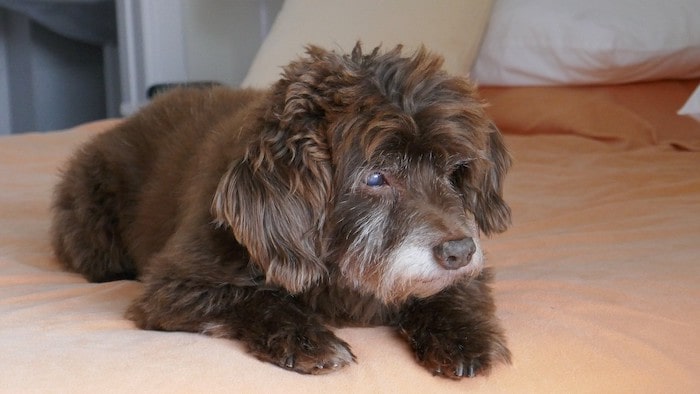
Is it a sign of a medical issue? Is it a behavioral problem? Or is it simply an environmental factor? By understanding the underlying reasons behind dog bed pooping, you can take steps to prevent it from happening again and create a happier, healthier living environment for both you and your furry companion.
So, buckle up and let’s explore the top reasons why dogs poop on beds and how to prevent it from happening in the future.
Reasons Why Dogs Poop on My Bed
There are several reasons why dogs may poop on beds. Some of these reasons include:
- Medical Issues: Dogs who are suffering from certain medical issues such as gastrointestinal problems, bladder infections, or medication side effects may have difficulty controlling their bowel movements. They may inadvertently soil their beds due to an inability to hold it in.

- Behavioral Issues: Dogs may also engage in certain behaviors that result in pooping on beds. Separation anxiety, fear, territorial marking, and lack of proper training are all examples of behavioral issues that may contribute to this behavior.
- Environmental Factors: Environmental factors can also play a role in a dog’s decision to poop on a bed. If a dog doesn’t have access to outdoor space, they may not have anywhere else to relieve themselves. Changes in living arrangements, such as a new home or a new family member, can also be stressful for dogs and cause them to act out in various ways, including pooping on beds.
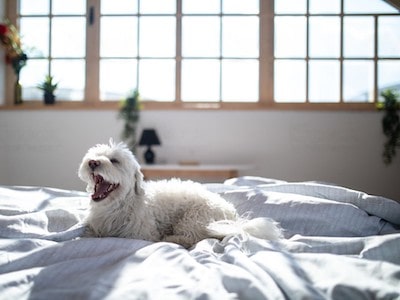
- Separation anxiety: Dogs who suffer from separation anxiety may experience extreme stress when left alone, leading to destructive behavior such as pooping on the bed.
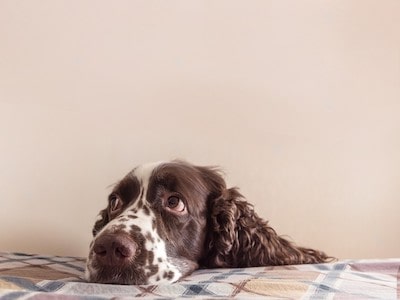
- Fear: Dogs who are fearful of certain situations or objects may poop on the bed out of fear or anxiety.

- Territorial marking: Dogs may mark their territory by pooping on beds or other objects in the home. This behavior is more common in unneutered male dogs but can occur in any dog.
- Lack of proper training: Dogs who have not been properly trained may not understand where they are supposed to go potty, leading to accidents on beds or other inappropriate places. It’s crucial to train your dog to go potty outside or in a designated area to avoid accidents in the home.
What Should I Do If My Dog Poops On My Bed?
Finding that your dog has pooped on your bed can be frustrating and stressful, but it’s important to handle the situation calmly and appropriately. Here are some steps you can take if your dog poops on your bed:
- Remove your dog from the bed: If you find your dog on the bed, don’t yell or physically punish them. Instead, calmly and promptly remove them from the bed. This helps to avoid instilling fear and anxiety in your pet.

- Clean up the mess: Gently wipe away as much of the poop as you can with paper towels or a cloth. Subsequently, employ an enzymatic cleaner meant for pet messes to completely cleanse the spot. Refrain from using ammonia-based cleaners, since these may actually lure dogs back to that area.
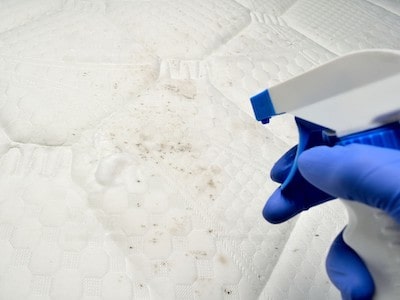
- Determine the cause: To ascertain the motivation behind your dog defecating on the bed, investigate if it was a medical issue, a behavioral concern or an environmental element that caused it. This will enable you to take the necessary steps to avoid this situation occurring again.
- Prevent future accidents: If the cause of the accident was a behavioral or environmental issue, measures should be taken to stop future occurrences. This might involve allowing more time for your dog to go outside and do its business, training it to stay in its crate when you are absent, or designating an area inside where it can relieve itself.
- Consult with your vet or a professional trainer: Should you have any suspicions regarding a medical issue or be finding it difficult to address a behavioral problem, seek advice from your veterinarian or consult a professional trainer. They can assist in pinpointing the difficulty and creating an action plan for rectifying the behavior.
How To Stop Your Dog From Pooping in Your Bed?
Now that we’ve identified some of the reasons why dogs may poop on beds, let’s explore some solutions and prevention methods to help prevent this behavior from happening in the future.
- Provide regular outdoor potty breaks: Make sure your dog has regular opportunities to relieve themselves outside. Depending on your dog’s age and breed, they may need to go out as often as every hour or two.

- Establish a designated potty area: Consider creating a designated potty area in your yard or home. By consistently bringing your dog to the same spot to go potty, they’ll learn where it’s appropriate to go and be less likely to have accidents in inappropriate places like your bed.
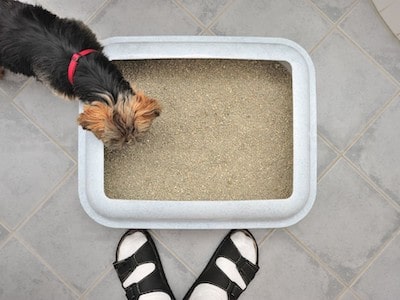
- Crate train your dog: If you’re unable to supervise your dog or need to leave them alone for a period of time, consider crate training. Dogs are naturally den animals and often feel more secure in a small, enclosed space. Be sure to gradually introduce your dog to the crate and never use it as punishment.
- Address separation anxiety: If your dog suffers from separation anxiety, work with a professional trainer to address the behavior. This may include gradually increasing the amount of time you leave your dog alone, providing them with plenty of toys and distractions, and using positive reinforcement to reward good behavior.
- Consult with your vet: If you suspect a medical issue may be causing your dog’s bed pooping, consult with your veterinarian. They can perform a thorough examination and recommend appropriate treatment.

FAQs
Dogs pooping on beds is not normal behavior and usually indicates there’s an issue that needs to be resolved.
Yes, positive reinforcement such as treats or praise for good behavior can help encourage dogs to establish good potty habits and prevent accidents in inappropriate places like beds.
Yes, if your dog continues to poop on your bed despite your efforts to address the behavior, seek help from a professional trainer or behaviorist who can work with you to identify the underlying cause and develop a plan to correct the behavior.
To clean up after your dog poops on your bed, use paper towels or a cloth to carefully remove as much of the poop as possible, then use an enzymatic cleaner designed specifically for pet messes to thoroughly clean the area.
Conclusion
In conclusion, while finding your dog has pooped on your bed can be frustrating and unpleasant, it’s important to approach the behavior with patience and understanding. By identifying the underlying reasons why dogs may poop on beds, such as medical issues or anxiety, and taking steps to address those issues, you can help prevent the behavior from happening in the future.
Providing regular potty breaks, establishing a designated potty area, crate training, and working with a professional trainer can all be effective strategies for correcting this behavior.
Remember to always use positive reinforcement and avoid punishment, and consult with your veterinarian if you suspect a medical issue may be contributing to the behavior. With patience, consistency, and effort, you can help your furry friend establish good potty habits and live a happy, healthy life.

Ellis is a retired veterinary technician and full-time contributor at DogLovesBest. He likes writing about pet health care tips and reviews the products that are useful for fidos on a daily basis.
Ellis also guardians a Siberian husky, Nova, and a cat named Shilly. They all live happily with his wife Ammy, and both the dogs on a seaside apartment in Queens, NY.
